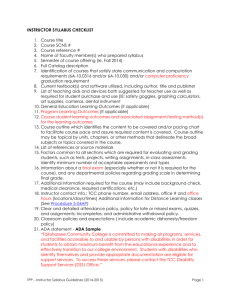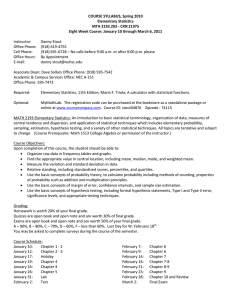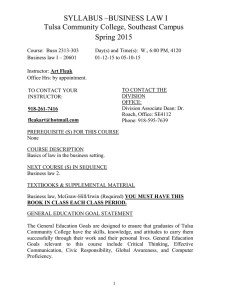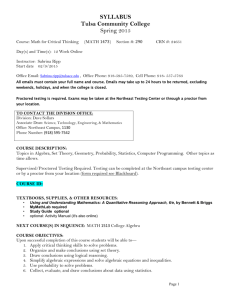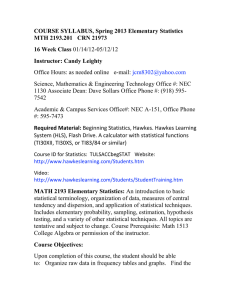BIOL_1114_102_30946_201030 - Blackboard Learn
advertisement
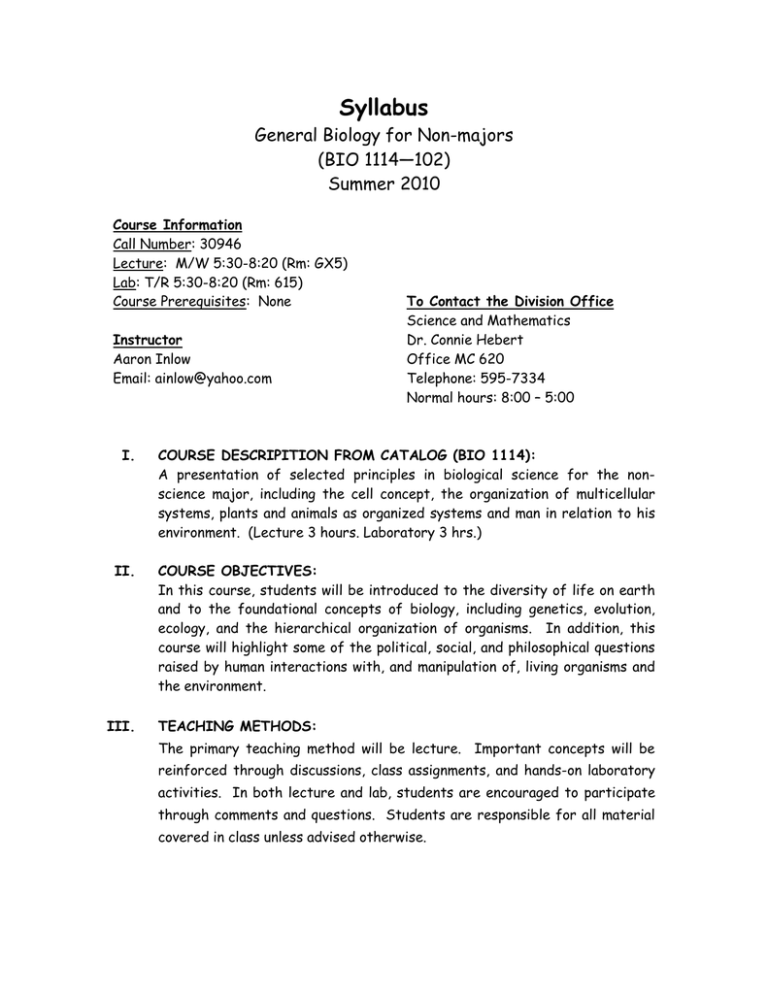
Syllabus
General Biology for Non-majors
(BIO 1114—102)
Summer 2010
Course Information
Call Number: 30946
Lecture: M/W 5:30-8:20 (Rm: GX5)
Lab: T/R 5:30-8:20 (Rm: 615)
Course Prerequisites: None
Instructor
Aaron Inlow
Email: ainlow@yahoo.com
To Contact the Division Office
Science and Mathematics
Dr. Connie Hebert
Office MC 620
Telephone: 595-7334
Normal hours: 8:00 – 5:00
I.
COURSE DESCRIPITION FROM CATALOG (BIO 1114):
A presentation of selected principles in biological science for the nonscience major, including the cell concept, the organization of multicellular
systems, plants and animals as organized systems and man in relation to his
environment. (Lecture 3 hours. Laboratory 3 hrs.)
II.
COURSE OBJECTIVES:
In this course, students will be introduced to the diversity of life on earth
and to the foundational concepts of biology, including genetics, evolution,
ecology, and the hierarchical organization of organisms. In addition, this
course will highlight some of the political, social, and philosophical questions
raised by human interactions with, and manipulation of, living organisms and
the environment.
III.
TEACHING METHODS:
The primary teaching method will be lecture. Important concepts will be
reinforced through discussions, class assignments, and hands-on laboratory
activities. In both lecture and lab, students are encouraged to participate
through comments and questions. Students are responsible for all material
covered in class unless advised otherwise.
IV.
TEXBOOKS, SOFTWARE, AND SUPPLIES
TEXTBOOKS
Essential Biology (3rd edition) by Neil A. Campbell, Jane B. Reece, and
Eric J. Simon.
Biology: Laboratory Manual for Non-Majors (5th edition) by Mary G.
Phillips
Software:
Microsoft Office 2007. (You can download a free copy of this
software through Blackboard.)
V.
TCC BLACKBOARD –Course Documents
Students are expected to use Blackboard to obtain course information (e.g.,
syllabus, PowerPoint lectures, assignments, announcements).
VI.
EVALUATION
Students will be evaluated through a combination of exams, quizzes,
assignments, and laboratory reports. The final grade will be calculated by
dividing the total points earned by the total points possible. The standard
grading scale will be used (see below).
Lecture Exams: 3 lecture exams worth 100 points each (300 points)
Final exam: one comprehensive final exam (200 points)
Lab Final Exam: (100 Points)
Quizzes: 5 quizzes worth 10 points each (50 points)
Laboratory Reports: 12 lab reports (12X10=120 points)
Zoo Project: (100 Points)
Genetic Disorder Research: (50 Points)
Total points --------------------920 points
Grading Scale
90%-100% (828-920) = A
80%-89% (736-827) = B
70%-79% (644-735) = C
60%-69% (552-643) = D
0-58% (0-551) = F
VII.
ATTENDANCE AND MAKEUP POLICY
Regular attendance is strongly encouraged in both lecture and laboratory
sessions. Although no credit is given for attendance per se, your presence
and participation are essential to learning the material and succeeding in this
course. In addition, missing class usually means missing assignments, quizzes,
or exams. The instructor may automatically withdraw (AW) a student from
the course as a result of excessive absences from lecture and/or laboratory
sessions.
Lab activities cannot be made-up under any circumstances.
Makeup exams and late assignments in lecture will be allowed only in
extenuating circumstances, such as family crisis or illness.
In the event of
an absence, students are responsible for contacting the instructor in
advance of the missed class session.
If contact is not made in a timely
manner, the make-up exam or late assignment will not be accepted.
VIII.
STUDENT SUPPORT SERVICES
A complete list of student support services can be found in the Resources
section of the Blackboard course site.
This includes information about
college services, free tutoring services, software support, and online
tutorials related to course concepts.
IX.
COURSE WITHDRAWAL
The deadline to withdraw from a course shall not exceed 3/4 the duration of
any class. Contact the Counseling Office at any TCC campus to initiate
withdrawal from a course ('W' grade) or to change from Credit to Audit.
Check the TCC Academic Calendar for deadlines.
Students who stop
participating in the course and fail to withdraw may receive a course grade
of “F,” which may have financial aid consequences for the student.
X.
COMMUNICATIONS:
Email: All TCC students receive a designated “MyTCC” email address (ex:
jane_doe@mail.tulsacc.edu).
All communications to you about TCC and
course assignments will be sent to your MyTCC email address; and you must
use MyTCC email to send email to, and receive email from, the instructor
regarding this course. You can access MyTCC at https://portal.tulsacc.edu
XI.
CLASSROOM ETIQUETTE:
Open and mutually respectful communication of varied opinions, beliefs,
and perspectives during classroom or online discussion encourages the
free exchange of ideas that is essential to higher learning and to the
ability to learn from each other. Please be respectful and treat other
students and the instructor as you would wish to be treated.
Please turn off all phones and other cellular devices. Use of all other
electronic device is at the discretion of the instructor.
No food or drinks are allowed in the lab.
No children are allowed in
lecture or in lab at any time.
XII.
ADA POLICY: STUDENTS WITH DISABILITIES:
TCC provides accommodations for qualifying students in compliance with the
Americans with Disabilities Act. For information, students may contact the
disabled Student Resource Center, 918-595-7115, or the Resource Center
for the Deaf and Hard of Hearing, 918-595-7428V, 918-595-7434TTY.
XIII.
ACADEMIC DISHONESTY:
Academic dishonesty (cheating) is defined as the deception of others about
one’s own work or about the work of another.
Academic dishonesty or
misconduct is not condoned or tolerated at campuses within the Tulsa
Community College system. Tulsa Community College adopts a policy
delegating certain forms of authority for disciplinary action to the faculty.
In the case of academic dishonesty a faculty member may:
Ask the student to redo an assignment/test or a substitute
assignment/test;
Record a "zero" for the assignment/test in question;
Recommend to the student that the student withdraw from the class, or
administratively withdraw the student from the class;
Record a grade of "F" for the student at the end of the semester.
Faculty may request that disciplinary action be taken against a student
at the administrative level by submitting request to the Dean of Student
Services.
XIV.
INSTITUTIONAL STATEMENT:
Each student is responsible for being aware of the information contained in
the TCC Catalog, TCC Student Handbook, Student Code of Conduct Policy
Handbook, and semester information listed in the class schedule. All
information may be viewed on the TCC website: www.tulsacc.edu.
XV.
GENERAL EDUCATION GOALS:
General Education courses at TCC ensure that our graduates gain skills,
knowledge, and abilities that comprise a common foundation for their higher
education and a backdrop for their work and personal lives. TCC’s General
Education goals are: Critical Thinking, Effective Communication, Engaged
Learning, and Technological Proficiency.
XVI.
COMPUTER SERVICES ACCEPTABLE USE
Access to computing resources is a privilege granted to all TCC faculty,
staff, and students. Use of TCC computing resources is limited to purposes
related to the College’s mission of education, research, and community
service. See TCC Student Code of Conduct Policy Handbook
XVII.
SAFETY AND HEALTH ISSUES
Please advise the instructor of pertinent health issues or medications you
may be taking in case an emergency arises.
XVIII.
SYLLABUS CHANGES
Occasionally, changes to the syllabus may be necessary. Students will be
notified of any changes to the syllabus in writing.
Class Date
June 7
BIO 1114 – Biology for Non-Majors
Lecture Schedule – Summer 2010
Lecture
Chapter
Introduction
Chemistry for Biology
1-2
Molecules of Life
Tour of the Cell
3-4
June 14
The Working Cell
5
June 16
Exam #1 Chapters 1-5
June 21
Cellular Respiration
Photosynthesis
6-7
Cellular Reproduction
Patterns of Inheritance
8-9
Structure and Function of DNA
How genes are Controlled
10-11
June 9
June 23
June 28
June 30
Exam #2 Chapters 6-11
July 5
No Class – Independence Day Holiday
July 7
How Populations Evolve
Biological Diversity
13-14
Evolution of Microbial Life
Plants and Fungi
15-16
July 14
Evolution of Animals
17
July 19
Exam #3 Chapter 13-17
July 21
Ecology of Organisms and Populations
Communities and Ecosystems
18-19
July 26
Human Impact on the Environment
20
July 28
Lecture Final Exam – Comprehensive
July 12
Class Date
BIO 1114 – Biology for Non-Majors
Lab Schedule – Summer 2010
Lab
Lab #
June 8
Use of the Microscope
5
June 10
Chemistry for Biology
4
June 15
Cell Structure and Function
6
June 17
Cell Division
8
June 22
Movement of Water in Cells
7
June 24
DNA Structure & Replication 10
June 29
Inoculate Petri Dishes for Lab #13
Place Eggs at Oxley / Off Campus
July 1
Collect Data at Oxley
July 6
Bacteria and Fungi
13
July 8
What is a Protistan?
14
July 13
Research Project Genetic Disorder
July 15
Rat Dissection
20
July 20
Everyday Botany
22
July 22
Zoo Project / Tulsa Zoo / Off Campus
July 27
Redbud Valley Nature Preserve / Off Campus
July 29
Lab Final Exam

